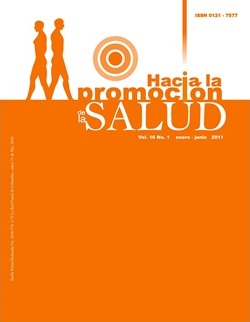Authors
Abstract
Objective: the purpose of this research was to reflect on how to set up some alternatives for the development the central-western Colombian region during the period 2007-2009. The discussion of this article focuses on two emerging categories in the research process: collective construction as a vanishing line and recreation of the local as a resistance scenario. These categories are the result of practices and the community leaders' unveiled discourse about the configuration of alternative bets for development. Methodology: the development of the research was carried out using the method of grounded theory and, with it, the emergent design to process and analyze the information obtained. Techniques for collecting information were open interviews, focal group, non-participant observation and document review. The target population was made up of the community leaders belonging to base organizations. Results: the results are presented conceptually from a critical view point to notion and development, and methodologically the results are presented as determinant elements to advance in the construction of professional intervention methodologies in Social Work, especially in the area of environment and development. Conclusions: the empowerment of base communities implies their mobilization with the objective of generating a breaking off from the system. In this sense, the alternative bets for development are profiled as vanishing lines and resistance scenarios before the established neoliberal paradigm.
Keywords
References
Hernández Sampieri R, Fernández-Collado C, Baptista Lucio P. Metodología de la Investigación. 4th ed. México: McGraw-Hill; 2008.
Escobar A. Globalización, Modernidad y Desarrollo. [En línea] 2002 [citado 2009 Ene]. Disponible en URL: http://www.oei.es/salactsi/escobar.htm.
Aguirre M. Aproximación al tema Paradigmas de Desarrollo. [En línea] [citado 2009 Mar]. Disponible en URL: http:// www.rau.ed.uy/fcs/dts/Mip2/paradigmasdesarrollo.pdf.
Coraggio JL. [En línea] [citado noviembre 2008]. Disponible en URL: http://wwwcoraggioeconomia.org/jlc/archivos%20para%20descargar/Poder%20local%20poder%20popular%20_1987_.pdf
Noguera AP. El Reencantamiento del Mundo. Editorial Universidad Nacional de Colombia. Programa de las Naciones Unidas para el Medio Ambiente; 2004.
Heidegger M. El origen de la obra de arte. En: Vattimo Gianni. El Fin de la Modernidad. Madrid: Alianza; 1996.
Hissong R. Las Teorías y las prácticas de desarrollo desde la perspectiva de la modernidad. Cuadernos Ocasionales; 1996.
Santos M. La Naturaleza del Espacio. Técnica y Tiempo. Razón y Emoción. Barcelona: Ariel; 2000.
Augé M. Por una Antropología de la Movilidad. Barcelona: Gedisa; 2007.


 PDF (Español)
PDF (Español)
 FLIP
FLIP






















